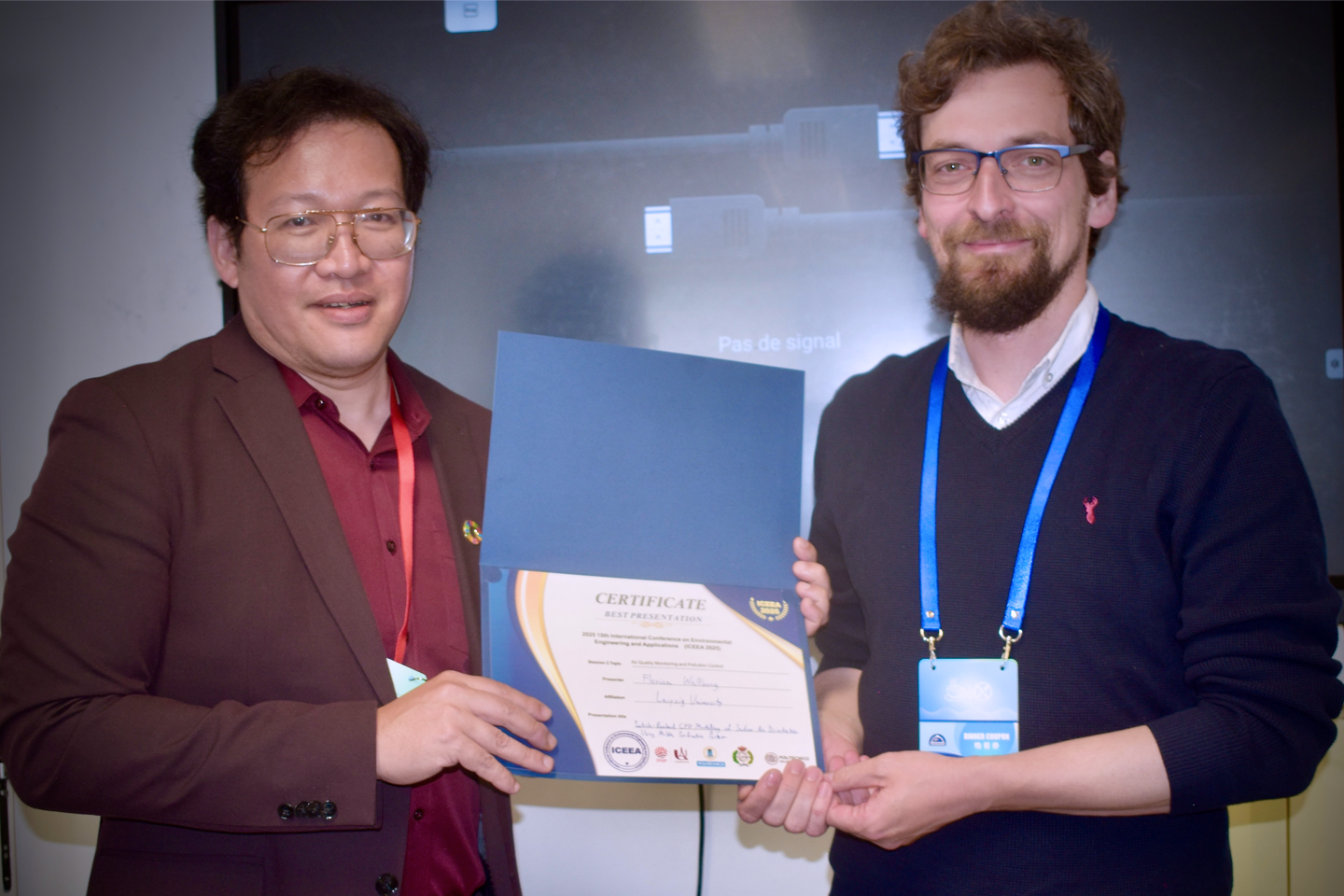Award for Dr Florian Wallburg at the 15th ICEEA 2025, which took place from 27 to 29 May 2025 in Paris.
Dr Florian Wallburg from the Faculty of Engineering at HTWK Leipzig was awarded the Best Presentation Award at the 15th International Conference on Environmental Engineering and Applications (ICEEA 2025) for his presentation on the topic of "Air Quality Monitoring and Pollution Control". The award was presented as part of nine technical sessions. The Best Presentation Award recognises, among other things, the originality of the contribution, the scientific basis, the quality of the data preparation and the presentation style in English.
The award-winning contribution was created under the direction of Prof. Dr Stephan Schönfelder and Dr Florian Wallburg as part of the BMBF-funded research project BeCoLe - UVC air disinfection in indoor spaces (funding reference: 13GW0597D). The research work is based on close cooperation between HTWK Leipzig and Dinies Technologies GmbH.
ICEEA 2025 took place at the Université Paris Cité, a traditional centre of scientific teaching where Marie and Pierre Curie once worked. In this historic academic setting, Dr Florian Wallburg presented the paper "Particle-Resolved CFD Modeling of Indoor Air Disinfection Using Mobile Purification Systems", which deals with the precise simulation of the disinfection performance of mobile UVC air purifiers, on behalf of the entire research team from HTWK Leipzig and Dinies Technologies GmbH.
The aim of the BeCoLe project is to systematically research the effect and safety of UVC radiation for indoor air disinfection. The excellent presentation introduced a particle-based CFD (Computational Fluid Dynamics) model that simulates the UVC exposure of individual aerosol particles within a device in detail. This simulation was used to determine specific disinfection performance for various airborne pathogens such as Staphylococcus aureus, Mycobacterium tuberculosis, SARS-CoV-2, influenza A and adenovirus. The results show that Staphylococcus aureus, Mycobacterium tuberculosis and SARS-CoV-2 in particular are inactivated very effectively - almost completely. The influenza A virus can also be significantly reduced. The effect is somewhat less effective with the more resistant adenovirus, which is less sensitive to UVC radiation. Overall, it is clear that mobile UVC air purifiers are an effective tool for reducing exposure to indoor pathogens - although the effectiveness varies depending on the pathogen.
"It was an exciting and fruitful exchange with international researchers in the field of indoor air quality - with many interesting insights and impulses for our further work," summarised Dr Florian Wallburg.
Stephan Schönfelder, project manager at HTWK Leipzig, emphasised the international connectivity of the research: "I am pleased that we can make very strong contributions at an international level with our current research activities in the BeCoLe network."

The session was moderated by Prof. Dr Siwatt Pongpiachan, an internationally recognised expert on air quality and technological developments in environmental monitoring. Pongpiachan is a professor at the NIDA (National Institute of Development Administration, Bangkok) and, with over 2,500 scientific citations, is one of the established voices in his field of research.
The award in Paris confirms the relevance of the research work at HTWK Leipzig on indoor air quality - an area that is becoming increasingly important not only in the context of the pandemic, but also with regard to future health challenges.
The presentation can be accessed via the following link: http://dx.doi.org/10.13140/RG.2.2.25633.11366